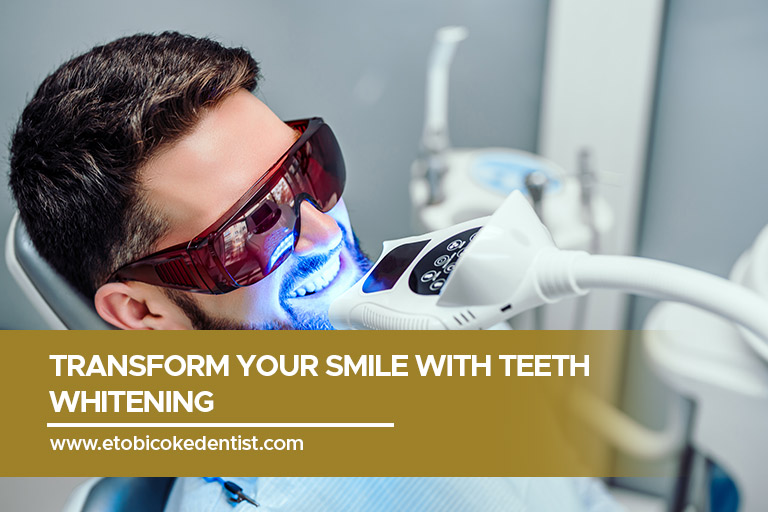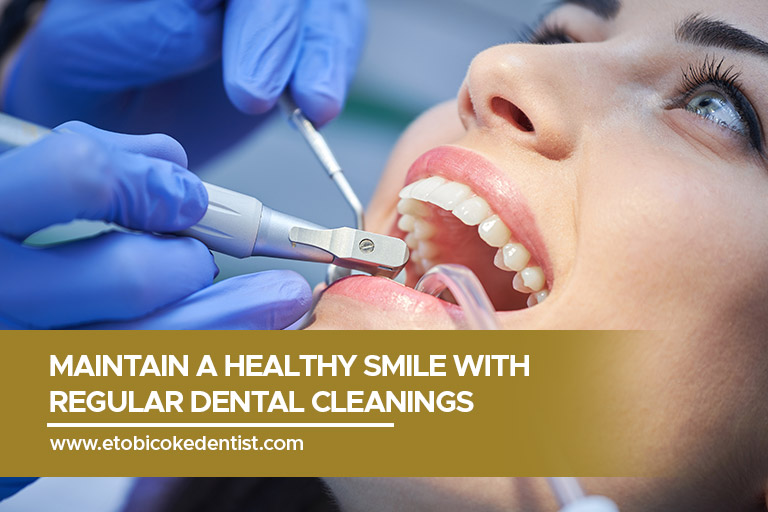Proper dental hygiene and oral care are essential for overall health and well-being. Keeping teeth clean and healthy requires regular brushing, flossing, and regular visits to the dentist.
Two common dental procedures that people often confuse are teeth whitening and dental cleaning. While both procedures can improve the appearance of teeth, they serve different purposes and have different methods.
What Is Teeth Whitening?

Teeth whitening is a cosmetic procedure designed to remove stains and discolouration from teeth using chemicals.
There are two main methods of teeth whitening:
- Over-the-Counter (OTC) Whitening Products
Teeth whitening at home includes whitening strips, gels, and toothpaste, which are available without a prescription and can be used at home. OTC teeth whitening products typically contain low concentrations of hydrogen peroxide or carbamide peroxide, which are the active ingredients that whiten teeth.
- Professional in-Office Whitening
This procedure is performed by a dental professional and involves the use of a higher concentration of whitening agents and specialized equipment. During the professional teeth whitening procedure, a whitening gel is carefully applied to the teeth and activated using a specialized light or laser for effective results.
Top 3 Benefits of Teeth Whitening
- Aesthetic Improvements – This might be the primary reason why people want to whiten their teeth. Getting rid of discolouration caused by smoking or drinking too much tea or coffee can help improve confidence and overall appearance.
- Improved Oral Health – Patients who had their teeth whitened are more inclined to take care of their teeth after the treatment. Seeing the effects of teeth whitening can encourage them to maintain the results. They are more likely to brush and floss their teeth, leading to a healthier overall oral routine.
- Cost-Effective – While professional teeth whitening costs more than their OTC counterparts, it is a more cost-effective option, saving you more money in the long run. Whitening your teeth using OTC products, such as whitening toothpaste and strips, can take a long time to produce results. Also, it may need constant maintenance, adding up the cost eventually.
What Is Dental Cleaning?

Dental cleaning, also known as oral prophylaxis, is a procedure performed by a dental hygienist to remove plaque, tartar, and surface stains from teeth. It involves the use of specialized tools and techniques to clean teeth thoroughly and examine for dental issues or abnormalities.
Teeth Cleaning Process
- Dental Scaling and Removing Plaque and Tartar – A dental hygienist uses specialized tools to remove plaque from teeth and tartar buildup, particularly in hard-to-reach areas like between teeth and under the gum line.
- Polishing and Removing Surface Stains – The hygienist will then use a specialized polishing tool and abrasive paste to remove surface stains from teeth.
- Examining for Dental Issues or Abnormalities – During the cleaning process, the hygienist will examine the mouth for signs of tooth decay, gum disease, or other abnormalities.
Importance of Regular Dental Cleanings
- Preventing Tooth Decay and Gum Disease – Regular dental cleanings can help prevent tooth decay and gum disease by removing plaque and tartar buildup that can contribute to these issues.
- Maintaining Overall Oral Health – Regular dental cleanings are essential for maintaining overall oral health and detecting issues early before they become more severe.
Key Differences Between Teeth Whitening and Dental Cleaning
Understanding the distinctions between teeth whitening treatment and dental cleaning is essential for maintaining optimal oral health. While both procedures aim to improve the appearance of teeth, they serve different purposes and involve distinct methods.
Here are the key differences you need to know:
- Purpose and Goals
- Teeth whitening is primarily a cosmetic procedure designed to improve the appearance of teeth.
- Dental cleaning is focused on maintaining oral health by removing plaque, tartar, and surface stains and detecting issues early.
- Procedures and Methods Used
- Teeth whitening typically involves the use of chemical agents and light activation (zoom teeth whitening) to whiten teeth.
- Dental cleaning involves the use of specialized tools and techniques to clean teeth thoroughly and examine for dental issues or abnormalities.
- Professional Involvement and Expertise
- Teeth whitening can be self-administered with over-the-counter products, but professional supervision is recommended for best results.
- Dental cleaning should always be performed by a dental professional, and regular check-ups are essential for optimal oral health.
Choosing the Right Option
When it comes to deciding between teeth whitening and dental cleaning, it’s important to consider your personal goals and needs. If you’re primarily concerned with the appearance of your teeth and want to remove surface stains and discolouration, teeth whitening may be the right choice for you. However, if your main goal is to maintain optimal oral health and prevent dental issues, dental cleaning should be a priority.
It’s always a good idea to seek professional advice before undergoing any dental procedure. Your dentist or dental hygienist can assess your oral health and recommend the best course of action based on your specific needs and goals. They can also provide guidance on the appropriate whitening method if you choose to pursue teeth whitening.
In some cases, combining teeth whitening with regular dental cleanings can be a great option. Dental cleaning ensures that your teeth are thoroughly cleaned and any underlying issues are addressed before whitening. This can maximize the effectiveness of teeth whitening and provide you with long-lasting results.
Teeth Whitening vs Dental Cleaning Final Thought
Teeth whitening and dental cleaning are distinct procedures that serve different purposes in oral care. By understanding the differences between these procedures and consulting with a dental professional, you can make informed decisions about your oral care routine and achieve a healthy and bright smile.
Remember, regular dental check-ups and cleanings are crucial for overall oral health, regardless of whether you choose to undergo teeth whitening or not. Take care of your teeth, follow good oral hygiene practices, and consult with your dentist for personalized advice to ensure a healthy and radiant smile for years to come.
Are you looking for a trusted dental practice in Etobicoke that provides exceptional care for all your oral health needs? Look no further than Dr. Mark Rhody Dentistry! Our dedicated Etobicoke dentist is committed to delivering top-notch dental services, such as professional teeth cleaning and dental cleaning, and ensuring your comfort throughout every visit.
Take the next step towards a healthier smile by scheduling your appointment with Dr. Mark Rhody Dentistry today! Give us a call today at (416) 231-4281, or visit our dental clinic in Etobicoke.
